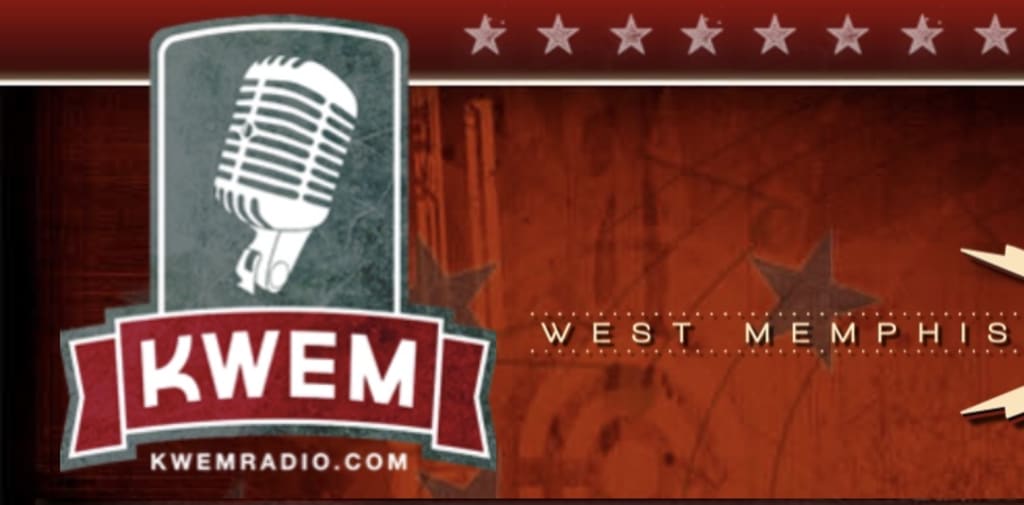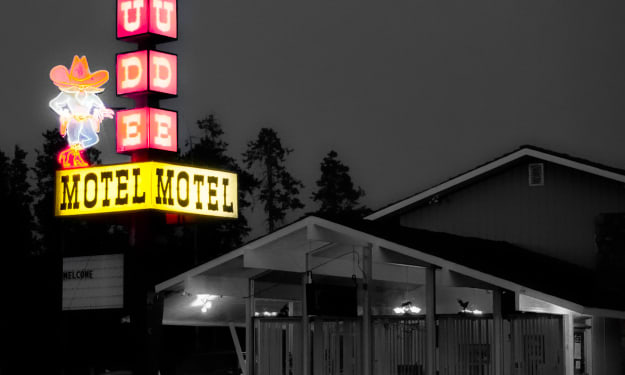
I am walking down the hallway on a tour of the campus of ASU Mid-South, a community college in Arkansas, when I notice display cases filled with black and white pictures. Intrigued, I look closer and see pictured of Elvis and Johnny Cash, along with several others I don't recognize, but are clearly musicians posing with their instruments. Curious, surprised, not understanding the connection to a community college, I ask about them. My tour guide's face lights up, follow me she says, Turning the corner i am surprised to see a full radio station behind a glass window, it's call letters displayed in neon, KWEM.
I must have looked very confused, but my guide proudly shared the college college had taken over the station in 2003 to carefully preserve it's rich history in music as the station that launched many major artists in the 50s. I am fascinated. I spend considerable time exploring the displays and looking at the station, replicated to how it looked 60 years ago, with the large microphones, old reel to reels, and the "on the air" light. The equipment is no longer used as the station is run now in the back in a nondescript room powered with computers and digital music, and is not nearly as interesting.
I learn that KWEM's history begins in 1947 as a small AM radio station in West Memphis, Arkansas, then a music hotspot with over 30 live music clubs that rivaled its neighbor and namesake across the Mississippi in Tennessee. Today West Memphis's heyday as a music mecca is long past, and is just a small bedroom community of 26,000 as part of the greater Memphis metropolitan area.
KWEM was an avenue to discovery for local artists as its niche was its pay to play format, where for $15 to $20 musicians could buy airtime, playing their music live, allowing those that had not yet achieved success to get recognition. It was also unusually in that in a time of segregated music stations both blacks and whites played there in all types of music from blues to country.
The story goes that a young B.B. King listened to KWEM played from a car radio while he was working the fields of Mississippi and so when he decided to take his guitar to the city in 1948 he went straight to the studio on his first day playing on the Sonny Williamson show live on air which led a regular show at a local club, Miss Annie's diner. Interestingly, he went on to another radio station across the river, WDIA, where he became a singer and DJ, earning the nickname Blues Boy, which was eventually shortened to B.B.
A few years later, In 1954, an unknown Arkansas native Johnny Cash from nearby Dyess purchased time and made his first public appearance on the Saturday Night Jamboree, which turned into a weekly 15 minute show partially paid for by the lumber company he worked for. After much pestering, Cash was eventually able to sign on with Sun Records across the river in Memphis.
And Albert King, who grew up not far away in Forrest City, Arkansas, just 30 miles down the road, also played at the radio station and signed with Stax records, which had been started by employees from KWEM.
Other well know artists who got their state include Ike Turner, who was an engineer on the station, and Howlin Wolf had a regular show where he also was discover by Sam Phillips of Sun Records. Even Elvis had his debut radio broadcast at KWEM.
Arriving at home that evening I immediately look up KWEM as I am by nature curious and like to learn all the details. I learn that it is now broadcasted at FM 93.3 locally or is available on the web. I take out out my headphones and tune in. It still plays the music it made famous and I am treated with Albert King's Crosscut Saw, followed by Howlin Wolf.
I feel grateful that today I touched a bit of history and learned an appreciation the role small radio stations played in the development of much of our music. I do wonder if it weren't for KWEM and their pay to play format, would we have all of these famous musicians who got their start there.





Comments
There are no comments for this story
Be the first to respond and start the conversation.